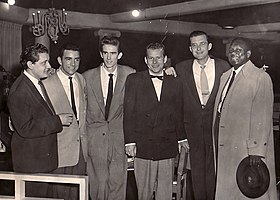Harry Carney
| Harry Carney | |
|---|---|

From left: Chris Gage, Louie Bellson, Stan "Cuddles" Johnson, Tony Gage, Fraser MacPherson, Harry Carney. (Photo from the Fred MacPherson estate.)
|
|
| Background information | |
| Born | April 1, 1910 |
| Origin | Boston, Massachusetts |
| Died | October 8, 1974 (aged 64) |
| Genres | Jazz |
| Occupation(s) | Musician |
| Instruments | Baritone saxophone, bass clarinet |
| Years active | 1930s - 1970s |
| Associated acts | Duke Ellington, |
Harry Howell Carney (April 1, 1910 – October 8, 1974) was an American jazz musician whose virtuosity on the baritone saxophone influenced generations of subsequent players. He also performed on clarinet and bass clarinet, as well as alto saxophone in the early years of his career. Mainly known for his 45-year tenure in Duke Ellington's Orchestra, Carney's strong, steady saxophone often served as the anchor of Duke's music.
Harry Howell Carney was born in 1910 in Boston, Massachusetts. He began on the piano at age six, moved to the clarinet at 13, and added the alto saxophone a year later. He grew up next door to future Ellington bandmate Johnny Hodges, four years his elder, who was an early influence on his music. His other main influences included clarinetists Buster Bailey and Don Murray and saxophonists Coleman Hawkins and Adrian Rollini.
After playing a variety of gigs in New York City at the age of 17, Carney joined Ellington in Boston in 1927. He initially played alto and soprano saxes, doubling on clarinet while Otto Hardwick handled the baritone parts. Carney initially vied with clarinetist Rudy Jackson for the hot clarinet solos and with Hardwick for alto and soprano solos. An example of this is on Blue Bubbles, a song with Carney on alto and soprano, and Hardwick on baritone. As Hardwick didn't stand out on baritone sax as much as his other horns, Carney saw an opportunity and immediately purchased a baritone sax. His progress was quick, and soon began being featured on the instrument.
When Otto Hardwick left Ellington in 1928 to go to Europe, Carney took over the lead alto parts with Johnny Hodges taking over the main alto and soprano parts. Harry Carney took a rare solo on tenor sax (borrowing Barney Bigard's horn) on the Ellington song Hot Feet. He also occasionally took a solo on clarinet, despite Bigard being the featured clarinetist with Ellington from 1928-1942. Examples include Bugle Call Rag, Rexatious (with Rex Stewart), the 1932 versions of Creole Love Call (his is the first clarinet solo), I Don't Know What Kind of Blues I've Got, It's Like Reaching For The Moon (with Teddy Wilson and Billie Holiday) and so forth. Carney performed a rare alto clarinet solo on Duke's Saddest Tale, and borrowed a bass clarinet for Blue Light in 1938.
...
Wikipedia
